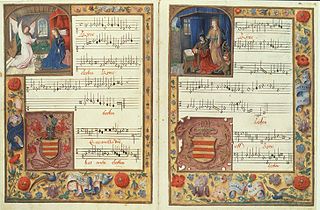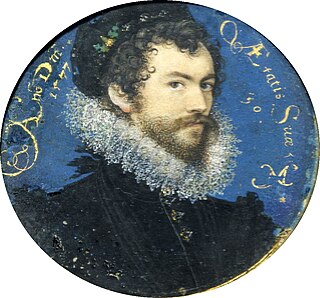Related Research Articles

The Mass, a form of sacred musical composition, is a choral composition that sets the invariable portions of the Eucharistic liturgy to music. Musical Masses take their name from the Catholic liturgy called "the Mass".

Johannes Ockeghem was a Franco-Flemish composer and singer of early Renaissance music. The most influential European composer in the period between Guillaume Du Fay and Josquin des Prez, Ockeghem was an important proponent of the Franco-Flemish School and among the greatest composers of 15th-century Europe. He was well associated with other leading composers of the time, and spent most of his career serving the French royal court under Charles VII, Louis XI and Charles VIII. Numerous poets and musicians lamented Ockeghem's death, including Erasmus, Guillaume Crétin, Jean Molinet and Josquin, who composed the well known Nymphes des bois for him.
Antoine Brumel was a French composer. He was one of the first renowned French members of the Franco-Flemish school of the Renaissance, and, after Josquin des Prez, was one of the most influential composers of his generation.
Nicolas Gombert was a Franco-Flemish composer of the Renaissance. He was one of the most famous and influential composers between Josquin des Prez and Palestrina, and best represents the fully developed, complex polyphonic style of this period in music history.

Jacob Obrecht was a Flemish composer of masses, motets and songs. He was the most famous composer of masses in Europe of the late 15th century and was only eclipsed after his death by Josquin des Prez.

Antoine Busnois was a French composer and poet of the early Renaissance Burgundian School. While also noted as a composer of motets and other sacred music, he was one of the most renowned 15th-century composers of secular chansons. He was the leading figure of the late Burgundian school after the death of Guillaume Dufay.

Pierre de la Rue was a Franco-Flemish composer and singer of the Renaissance. His name also appears as Piersson or variants of Pierchon and his toponymic, when present, as various forms of de Platea, de Robore, or de Vico. A member of the same generation as Josquin des Prez, and a long associate of the Habsburg-Burgundian musical chapel, he ranks with Agricola, Brumel, Compère, Isaac, Obrecht, and Weerbeke as one of the most famous and influential composers in the Netherlands polyphonic style in the decades around 1500.

The Chigi codex is a music manuscript originating in Flanders. According to Herbert Kellman, it was created sometime between 1498 and 1503, probably at the behest of Philip I of Castile. It is currently housed in the Vatican Library under the call number Chigiana, C. VIII. 234.
Johannes Regis was a Netherlandish composer of the Renaissance. He was a well-known composer at the close of the 15th century, was a principal contributor to the Chigi Codex, and was secretary to Guillaume Dufay.

The Hilliard Ensemble was a British male vocal quartet originally devoted to the performance of early music. The group was named after the Elizabethan miniaturist painter Nicholas Hilliard. Founded in 1974, the group disbanded in 2014.
Philippe Basiron was a French composer, singer, and organist of the Renaissance. He was an innovative and prominent composer of the late 15th century, and was praised by many of his contemporaries.
Matthaeus Pipelare was a Netherlandish composer, choir director, and possibly wind instrument player of the Renaissance.

Jeremy Summerly is a British conductor. He was educated at Lichfield Cathedral School, Winchester College, and New College, Oxford. While at Oxford he conducted the New College Chamber Orchestra and the Oxford Chamber Choir. After graduating with a first-class honours degree in music in 1982, he started work as a studio manager for BBC Radio, while pursuing postgraduate research in historical musicology at King's College London. Since 1991 he has been a presenter and reviewer for BBC's Radios 3 and 4, in particular for Radio 4's Front Row, and Radio 3's Record Review.
Pro Cantione Antiqua of London (PCA) is a British choral group which was founded in 1968 by tenor James Griffett, counter-tenor Paul Esswood, and conductor and producer Mark Brown. Their first concert was at St Bartholomew's, Smithfield with Brian Brockless conducting but, from an early stage, they were closely associated with conductor and musicologist Bruno Turner. Arguably, they were the leading British performers of a cappella music, especially early music, prior to the founding of the Tallis Scholars.
Over 40 settings of the Ordinary of the Mass using the tune L'homme armé survive from the period between 1450 and the end of the 17th century, making the tune the most popular single source from the period on which to base an imitation mass.
Guillaume Faugues was a French composer. Very little is known of his life, however, a significant representation of his work survives in the form of five mass settings. Faugues holds an important place in the history of the Parody mass because of his use of the technique, particularly in Missa Le serviteur.
Blue Heron, directed by Scott Metcalfe, is a professional vocal ensemble based in the Boston area. The ensemble presents an annual concert series in Cambridge, Massachusetts, and performs throughout New England as well as touring the US; it made its European debut in the United Kingdom in 2017.
The Huelgas Ensemble is a Belgian early music group formed by the Flemish conductor Paul Van Nevel in 1971. The group's performance and extensive discography focuses on Renaissance polyphony. The name of the ensemble refers to a manuscript of polyphonic music, the Codex Las Huelgas.
Ars Nova Copenhagen is a Danish vocal ensemble specialised in the interpretation of the polyphonic choral music of the Renaissance and new vocal music. It was founded in 1979 by composer Bo Holten among others. In 1996 Hungarian conductor Tamás Vetö was appointed chief conductor by the singers in the group and Holten founded his own ensemble, Musica Ficta (Denmark). Ars Nova Copenhagen is now led by Paul Hillier, and collaborates on a regular basis with his ensemble Theatre of Voices.

The Oxford Camerata is an English chamber choir based in Oxford, England. The Camerata was founded in 1984 by conductor Jeremy Summerly and singers David Hurley and Henrietta Cowling and gave its first performance on 22 May of that year. The ensemble consists of a core membership of fifteen singers, though personnel size varies according to the demands of the repertoire. While the Camerata is known for performing primarily unaccompanied repertoire, it has also performed accompanied repertoire, employing the services of the Oxford Camerata Instrumental Ensemble and the Oxford Camerata Baroque Orchestra.
References
- ↑ Thomas E. Bauer
- ↑ John Potter website "The Sound & the Fury - For the last three years John Potter, Richard Wistreich and Thomas Bauer have met in Bressanone (Brixen) to perform and record the music of Gombert. Brixen (in northern Italy) is twinned with Thomas Bauer’s home town of Regensburg and the group, expanded by up to six other German singers, has been known as the Vokalsolisten Ratisbona. The mixture of live concert and rehearsal recordings has produced two CDs for ORF, and on the current release the ensemble found itself renamed The Sound and the Fury. Two more CDs are now complete and the group will reassemble in Vienna in September to record two Ockeghem masses, also for ORF."
- ↑ Royal Northern College of Music - Richard Wistreich